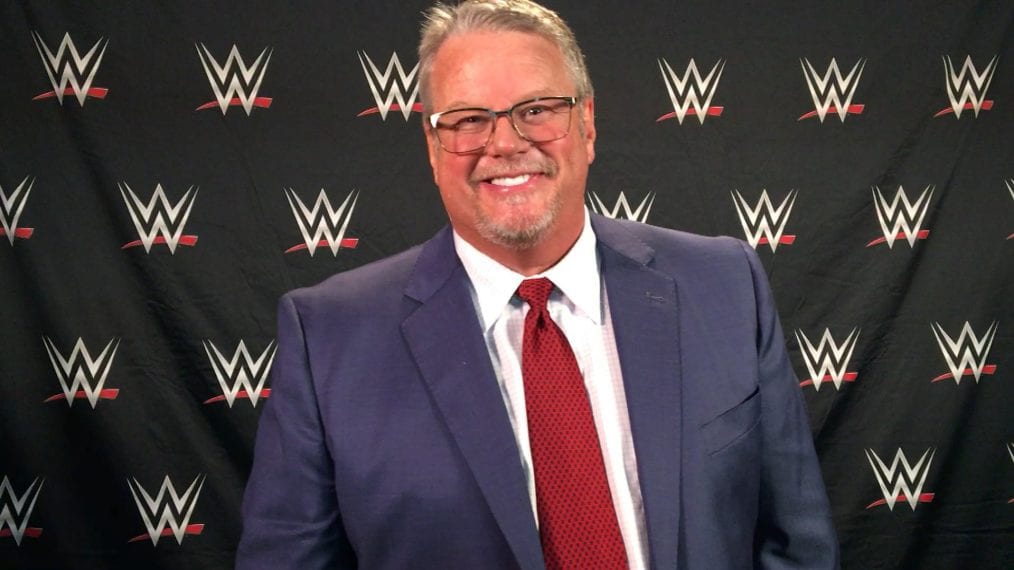
On a recent edition of the “Busted Open Radio” podcast, WWE executive Bruce Prichard clarified that the best worker in professional wrestling is the one who draws the bigger bucks.
You can check out some highlights from the podcast below:
On how Junkyard Dog wasn’t great in the ring but had charisma: “Guys that wanted to be in the NFL, couldn’t make it, well your next bet is Canadian Football League. So, if you’re on that side of the world, Stu Hart and Calgary Wrestling was on TV in the off-season, so [they’d say] ‘I’m going to go over here and learn to wrestle. He [Junkyard Dog] had charisma, he was the s***s, but he had charisma. And Stu would get him booked. Stu got him up. Then he comes down and Watts makes him the Junkyard Dog. Big nasty heel. But holy s**t did he have charisma!”
On what makes a wrestler the greatest worker: “To me, the greatest worker in the world is the guy who knows how to draw. I don’t give a s**t if it’s an 18-star match in the Tokyo Dome, it doesn’t matter, draw money. Draw money and you’re a great worker.”
In the world of professional wrestling, there is often a debate about what makes a wrestler the greatest worker. Is it their technical skills in the ring? Is it their ability to tell a compelling story? Or is it their charisma and ability to draw in a crowd? According to WWE executive Bruce Prichard, the answer is simple: the best worker is the one who draws the bigger bucks.
Prichard recently appeared on the “Busted Open Radio” podcast to discuss this topic and shed some light on what he believes makes a wrestler the greatest worker. He shared some interesting insights and anecdotes that give us a glimpse into the world of professional wrestling.
One example Prichard gave was about the late Junkyard Dog, who was not known for his technical skills in the ring but had an undeniable charisma. Prichard explained that Junkyard Dog started his wrestling career after failing to make it in the NFL and turned to the Canadian Football League. During the off-season, he would watch Stu Hart’s wrestling promotion on TV and decided to learn how to wrestle. Despite not being the most skilled in the ring, Junkyard Dog had an incredible presence and charisma that made him stand out. Stu Hart recognized this and got him booked, which eventually led to him becoming a big star in the wrestling world.
Prichard’s point about Junkyard Dog highlights an important aspect of being a great worker in professional wrestling – charisma. While technical skills are important, having that intangible quality that draws people in is equally crucial. It’s what separates the good from the great and can make or break a wrestler’s career.
But according to Prichard, charisma alone is not enough to be considered the greatest worker. The ultimate measure of a wrestler’s success is their ability to draw money. In other words, if a wrestler can consistently bring in a large audience and generate revenue for the promotion, they are considered a great worker. Prichard emphasized that it doesn’t matter if a match is hailed as an 18-star classic in the Tokyo Dome; if it doesn’t draw money, it doesn’t make the wrestler a great worker.
This perspective on what makes a wrestler the greatest worker is interesting because it challenges the traditional notion that technical skills and in-ring ability are the most important factors. While those aspects certainly play a role, Prichard’s emphasis on drawing money brings a business perspective to the discussion. After all, professional wrestling is an industry that relies heavily on ticket sales, pay-per-view buys, and merchandise revenue.
In conclusion, Bruce Prichard’s views on what makes a wrestler the greatest worker in professional wrestling provide a fresh perspective on an age-old debate. While technical skills and charisma are important, the ability to draw money and bring in a large audience is ultimately what sets a wrestler apart. It’s an interesting take that highlights the business side of professional wrestling and reminds us that at the end of the day, it’s all about the bottom line.
